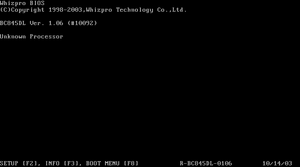
Whizpro BIOS (sometimes referred to as WhizBIOS) is a discontinued computer BIOS that was developed by Whizpro Technology from the late-90s to the mid-2000s. It was mainly used by industrial and/or embedded computers, mainly the ones made by BCM Advanced Technology and Iwill. Its earliest known instance is from 1999, while its latest known version is from around 2004-2005, seen on the BCM IN915GV and IN915GVR motherboards.
The last known trace of Whizpro Technology is a February 2005 version of WFLASH, a BIOS flashing tool developed by the company.[1].
Known versions
COMDEX Fall '99 Demo Release
This version was mentioned in the "News" section of the defunct whizpro.com website[2]. It is the earliest known version of Whizpro BIOS. A demo of it was supposedly showcased at COMDEX Fall '99 in Las Vegas in November 1999, however nothing else is known about this version. It is also uncertain whether the demo was for a pre-release or final version of the BIOS.
2000 Release
Based on information from the same website, Whizpro BIOS was already available for desktop and embedded computers in 2000. The desktop version supported the following chipsets by that point:
- VIA 693 Family (Apollo Pro Plus and Apollo Pro 133, with VT82C596B southbridge only)
- VIA 694 Family (Apollo Pro 133A, with VT82C596B southbridge only)
- VIA KX133 and KT133
- Intel 810 and 810E
- Intel 815E
Support for VIA's DDR-based chipsets and Intel's "Timna" processor was also announced, neither of which were released at the time, although the latter got cancelled later in 2000 and therefore was likely never supported.
Meanwhile, the embedded version supposedly supported the following chipsets:
- Intel 430TX
- Intel 440BX and 440ZX
- National Semiconductor Geode GXLC, SC1400 and 5530 series of processors
- STMicroelectronics STPC chipsets (exact models unclear, but likely all models released until that point)
January 2002 Release
According to the newer Whizpro website, the desktop version already supported the following platforms by January 2002 (along with the platforms already supported by the 2000 Release), although it is unclear when each platform exactly began being supported:[3]
- Intel 845 northbridge
- VIA P4X266 and P4M266 northbridges
- VIA KT133A and KM133 northbridges
- VIA PM133 northbridge
- VIA PRO266 and KT266 northbridges
- VIA "VT82C593A" (assumed to be a typo for VT82C596A), VT82C686A and VT82C686B southbridges
- Transmeta Crusoe TM3xxx and TM5xxx processors
- National Semiconductor Geode GX1 and GXM processors
May 2002 Release
According to the same website, Whizpro BIOS already supported various ALi (Acer Labs Inc.), AMD and SiS (Silicon Integrated Systems) chipsets by May 2002, although exact models of the supported chipsets are unknown. The website also claimed support for any x86 architecture based processor.
June 2003 Release
According to the same website, the following platforms were already supported by June 2003.
- Intel 875P northbridge
- Other variants of the Intel 845 northbridge (845D, 845G, 845GL, 845E, 845GE, 845PE and 845GV)
- VIA CLE266 northbridge
- VIA P4X266A, P4X333 and P4M333 northbridges
- VIA KT266A, KM266, KT333, KT400 and KM400 northbridges
- VIA PLE133, PLE133A, PLE133T and PM133 northbridges
November 2003 Release
According to the same website, the following platforms were already supported by November 2003:
- VIA K8T800 and K8M800 northbridges
November 2003 was also the last time the website was updated.
Later Releases
Although the Whizpro website has never been updated after November 2003, it is known that BCM's IN915GV and IN915GVR motherboards (both with the Intel 915GV northbridge and the ICH6 southbridge) shipped with Whizpro BIOS, although no ROM updates or dumps are available for either. These are likely one of the last instances of Whizpro BIOS, as the Intel 915 series chipsets were introduced in 2004, months after the Whizpro website was abandoned. They are also the only known instances of Whizpro BIOS for a PCIe-based platform.